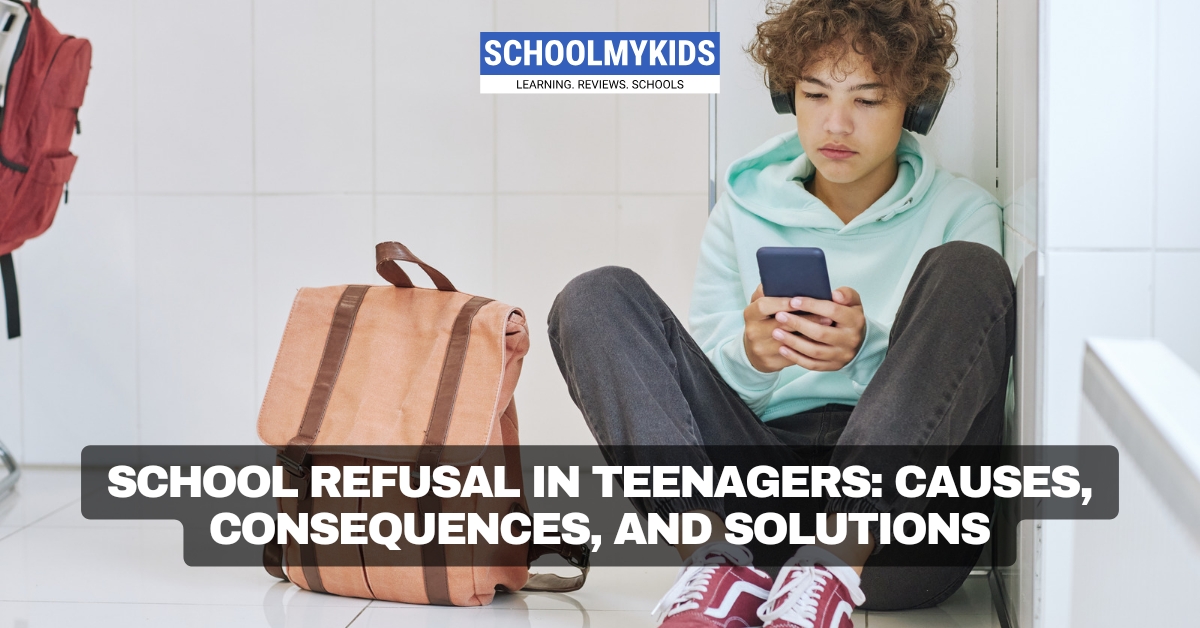School refusal, a common challenge faced by many teenagers, can be a distressing experience for both the child and their parents. While school refusal in teens is often viewed negatively, its origins can be multifaceted and deeply rooted. To address this effectively, we must approach it with compassion, seeking to understand the underlying causes.
This blog will explore the multifaceted reasons behind teens' school refusal and provide actionable strategies for parents to support their children.
The Nature of School Refusal in Teens
School refusal is not simply about a teen wanting to avoid school; it is often a symptom of deeper emotional or psychological issues. When a teenager consistently refuses to attend school, it is crucial to assess the situation from their perspective. This behavior can originate from various aspects, including academic struggles, bullying, social anxiety, or difficulties adjusting to new environments.
Common Causes of School Refusal in Teens
- Anxiety and Depression: Anxiety is one of the most dominant reasons for school refusal among teenagers. Many teens experience significant anxiety related to school, whether from academic pressures, social interactions, or fear of failure. Depression can also play a role, as it often leads to a lack of motivation and energy, making the prospect of attending school feel overwhelming. Teens may exhibit physical symptoms like stomach aches or headaches as a way to avoid facing their fears.
- Bullying and Social Issues: Bullying remains a significant concern for many teenagers. The fear of being bullied or ostracized can lead to a strong aversion to attending school. Additionally, social dynamics, such as conflicts with friends or feeling isolated, can exacerbate feelings of anxiety and lead to school refusal.
- Academic Struggles: If a teen is struggling academically, the fear of failing or being judged by peers and teachers can contribute to their refusal to attend school. This situation can create a cycle of avoidance where the teen feels unable to cope with the demands of school, leading to increased anxiety and further withdrawal.
- Rebellion Against Authority: While not the sole reason for school refusal, some teens may engage in this behavior as a form of rebellion against authority figures, including parents, teachers, or the school system itself. This rebellion can stem from a desire for independence, a reaction to perceived unfairness, or a way to assert control over their lives. However, it's crucial to understand that this rebellion often masks deeper emotional struggles rather than being purely an act of defiance.
- Family Dynamics: Family issues, such as divorce, illness, or financial stress, can significantly affect a teen's emotional well-being. These stresses can manifest as school refusal, as the teen may feel overwhelmed by their home situation and unable to cope with the additional pressures of school life.
- Environmental Factors: Changes in the school environment, such as transitioning to a new school or changes in teachers, can also trigger school refusal. Teens may feel uncertain and anxious about adapting to new settings, leading them to avoid school altogether.
Understanding the Child's Perspective
To effectively address school refusal in teens, parents must strive to understand their child's perspective. An honest conversation can help uncover the root causes of their distress. Instead of resorting to blame or frustration, parents should approach the situation with empathy and a willingness to listen.
Strategies for Parents
- Open Communication: Create a safe space for your teen. Ask open-ended questions about their affairs at school and listen without judgment. This dialogue can help identify specific triggers for their anxiety or distress.
- Collaborate with School Staff: Collaborating with teachers and school counselors can provide additional support for your teen. Discussing your child's challenges with school personnel can lead to tailored strategies that accommodate their needs, such as modified assignments or additional support during difficult classes.
- Encourage Gradual Exposure: If your teen is experiencing severe anxiety, consider a gradual return to school. This might involve starting with half-days or attending school for specific classes that they feel more comfortable with. Gradual exposure can help build confidence and reduce anxiety over time.
- Focus on Positive Aspects of School: Help your teen recognize the positive aspects of attending school, such as friendships, extracurricular activities, or subjects they enjoy. Highlighting these elements can shift their focus from anxiety to the benefits of being in a school environment.
- Seek Professional Help: If your teen's school refusal persists, it may be beneficial to seek the assistance of a mental health professional. Therapy can provide valuable coping strategies and help address underlying issues like anxiety or depression. Cognitive-behavioral therapy (CBT) is quite effective in treating anxiety-related school refusal.
- Avoid the Blame Game: It's essential to avoid placing blame on your teen for their refusal to attend school. Instead, work together to understand and address the issues at hand. This approach encourages a supportive environment where your teen feels valued and understood rather than judged.
Conclusion
School refusal in teens is a multifaceted issue that requires a compassionate and understanding approach. By recognizing the various emotional, psychological, and environmental factors at play, parents can better support their teens through this challenging time.









Be the first one to comment on this story.